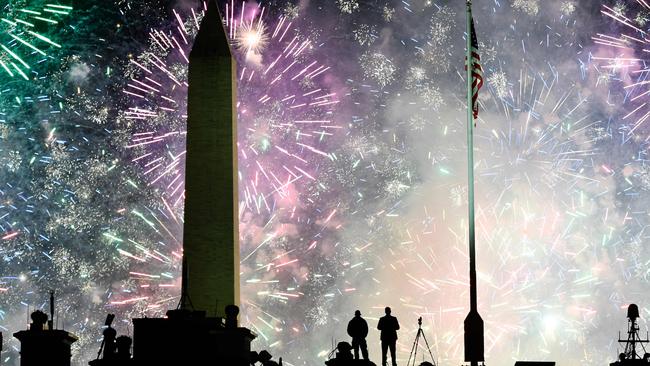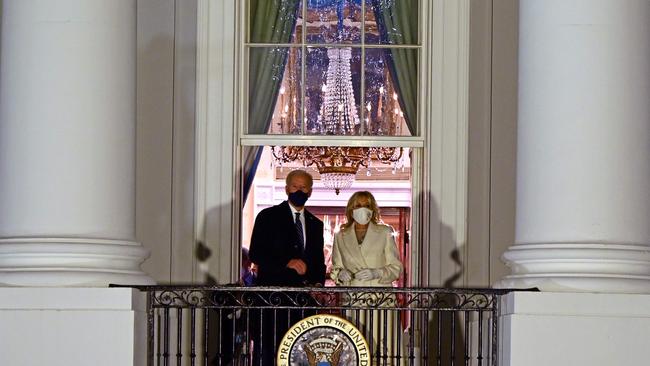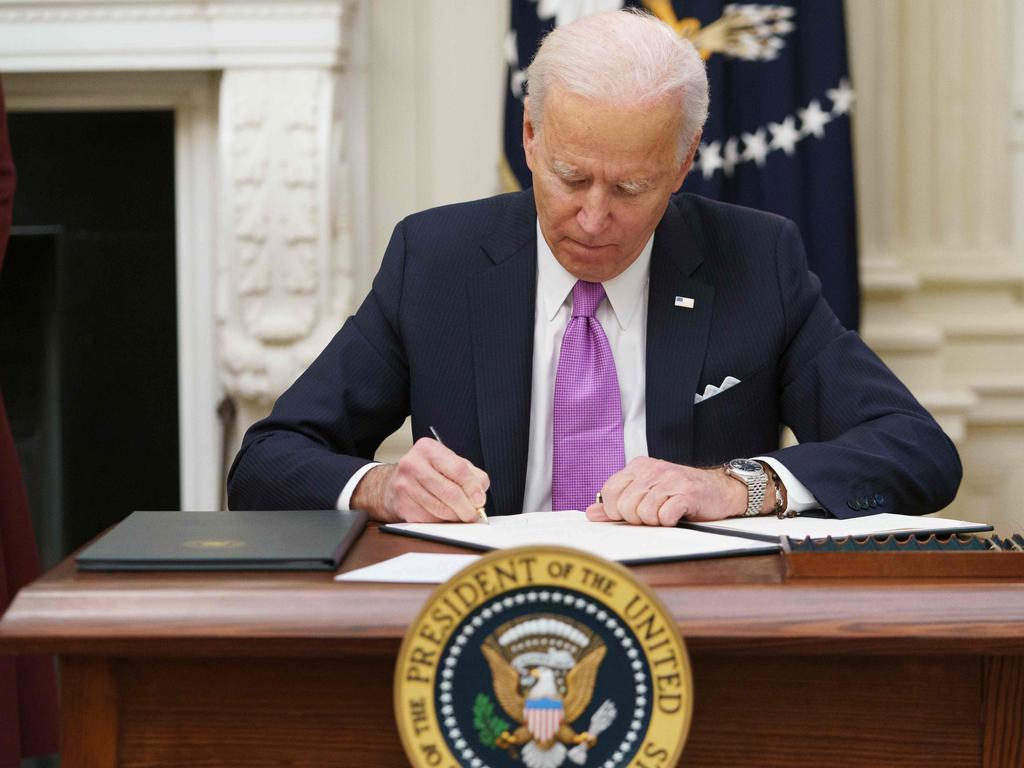New year, new president but same old challenges


This has always been the case, but it was accentuated by the advent of television and the
24-hour news cycle. And it is now wilder than ever, because social media amplifies and accelerates the process, and the algorithms of the digital giants are designed to reaffirm people’s views, rather than inform or challenge them.
So, just as governments, media and communities overdid responses to the challenges of last year — think about federal involvement in bushfire management, state borders closed for small coronavirus clusters, a 100-day lockdown in Victoria, and at least $300bn in additional debt — their seemingly unbridled optimism about the year ahead seems misplaced or, at least, exaggerated. Let me be a wet blanket and explain why, even with 2020 hindsight, 2021 promises plenty of pitfalls.
The culture wars show no sign of improving, with Cricket Australia, seemingly ashamed of its own name, pretending Australia Day does not exist even as it capitalises on the public holiday. At the other end of the spectrum, conservative forces align against an Indigenous voice to parliament, effectively arguing that governments should make special laws and policies for Indigenous Australians without consulting them.
Despite international travel bans and mandatory quarantine keeping our continent largely COVID-free, vastly deeper knowledge about the virus, better treatments against infections, and vaccines being rolled out around the world, most states remain eager to shut internal borders and impose onerous restrictions on their citizens. Flattening the curve unofficially has turned into a costly, traumatic and futile attempt to “beat” the virus.
A political/media class that has spent more than two decades arguing that any foreign citizens arriving in our country without visas or identification papers should be allowed to claim refugee status and stay, now is struck mute as Australian citizens are denied the right to return to their own country. Even state governments ban their own residents from crossing state borders to return to their homes.
Similarly, a usually noisy human rights lobby led by the Australian Human Rights Commission, NGOs, academics and publicly funded broadcasters has been rendered dumb when it comes to the rights of Australians in their own country. Pregnant women handcuffed in their homes for posting dissent on social media, people arrested for walking unmasked in the street, fishers moved on from jetties, couples harassed by mounted police for sitting in parklands — none of this raises the ire of the activists.
Nor do they complain about Australians barred from leaving our shores, plying their trade across state borders, or even being reunited with loved ones in neighbouring suburbs. So many fundamental rights have been surrendered with scant evidence of necessity or effectiveness that normality is a distant memory and any libertarian must be worried.

Even a year after the first coronavirus cases arrived here, we do not have a realistic and informed debate about proportionate responses and acceptable risks, just a false zero-sum choice between the worst northern hemisphere shambles and our lockdowns. The states — with the laudable exception of NSW — are implementing an undeclared elimination strategy, buttressed by federal welfare payments, inflicting personal trauma and economic pain.
The size of government has expanded dramatically, welfare dependency has been vastly increased and, if we know anything about economic and political management, it is that such measures are a cinch to introduce but difficult to reduce or withdraw. These tensions will play out dramatically this year.
A nation that has spent more than a decade in political convulsions about how to return the budget to surplus and rein in debt has forecast a deficit of more than $200bn in the coming year and government debt topping a trillion dollars within three years — yet there is scant political debate about the trajectory. Suddenly there seems to be a consensus that we can have tax cuts, spending increases and endless debt; nobody worries about a reckoning.
The changing of the guard in Washington has created much excitement about a rejuvenation of America under its oldest new president, a man who has spent half a century inside the beltway. Everything old is new again.
Donald Trump rose to power as a disruptive populist who gave voice to mainstream frustrations too often ignored by the political/media establishment. But even after he won (in the midst of pandemic chaos) 10 million more votes than he did in 2016, pushing Joe Biden to a tightly contested win, the liberal left shows no sign of learning any lessons from Trumpism.
Trump’s appalling behaviour post-election might help the GOP disown him, but it also helps his opponents ignore the frustrations of the 74 million people who voted for him. That would be unwise. The wearisome ranting about Trump’s appalling character has provided no insight or lessons for at least four years. But the way voters embraced his attacks on the political/media establishment and his prioritising of US jobs, secure borders, lower taxes, law and order, and unilateral strength over multilateral weakness should not be ignored by Biden, the Democrats, the media or the Republican establishment.
The accepted news narrative has turned on a dime. When violence erupted in response to Trump’s election in 2016, it was a media sidebar; likewise, the smashed windows, burned cars and calls for “resistance” that heralded his inauguration.
When violence erupted across the US for much of last year in a series of protests ostensibly organised by the Black Lives Matter cause — in reality encompassing a range of anti-Trump grievances — politicians and media described them as “mainly peaceful” and railed against the use of troops to keep the peace. But this month, after a day of ugly violence from pro-Trump extremists in Washington, the US Capitol was locked down and the same voices welcomed military control.
Violent protests are always deplorable, and no politician ought ever incite or make excuses for them. While we lamented the obscenity of protesters invading the Capitol and seeking to override democracy itself, we heard smug voices here declare we would never see such divisiveness darken our polity. But only 25 years ago, unionists and other activists stormed Parliament House in Canberra, smashing their way through glass doors, past police and security guards, in bloody scenes of vandalism and anarchy motivated primarily by “resistance” to the election of John Howard.
We should not expect to see consistency in the year ahead. With Trump gone, journalists have switched from spitting bile to dribbling mawkish platitudes.
CNN analyst Susan Glasser tweeted about how fact checkers at The Washington Post and CNN “may soon find work a bit … boring”. And in a “hold my beer” moment, her network’s political director, David Chalian, described lights in Washington as “extensions of Joe Biden’s arms embracing America”.
Let us hope Biden is perfect because if he is not, we might never know about it. The new President has already been widely applauded for taking the US back into the Paris climate deal; so a nation that was unilaterally leading the world in energy innovation and efficiency might now be brought back to the multilateral, regulated pack.
In his inauguration address, Biden spoke of a climate “crisis” and said a “cry for survival comes from the planet itself”. This was strange given the president he served for two terms, Barack Obama, declared more than a dozen years ago that his nomination was the moment the “rise of the oceans began to slow and our planet began to heal”.
On the rise of China, Middle East tensions and containing Iranian and North Korean nuclear ambitions, Biden will take the US back to multilateral channels — and therefore weaker positions — after Trump’s single-handed strategic unpredictability paid some dividends. Just because we might have understood Beijing’s and Tehran’s distrust of Trump does not mean we can afford to not be sceptical about their eagerness to work with Biden.
If Biden wants to bind the US together, then pursuing another impeachment of Trump is not a unifying start. The left needs to move forward, not back, and empathise with Trump voters rather than demonise them.
The global economy requires an energetic America, world peace demands a robust America and the pandemic only ends if the US gets on top of the virus at state and federal levels. Australia needs the US to be strong rather than compliant, respected rather than liked.
We know the new US leadership will be more orthodox and less abrasive; and it will face far less internal opposition. But in a year filled with economic, strategic and health challenges, we have no guarantees it will be any more effective.




The golden rule for keeping some context around political and media debate is that nothing is ever as good or as bad as it seems. The zeitgeist blows strong, and the political/media class tends to overreact and overcorrect in endless oscillations.